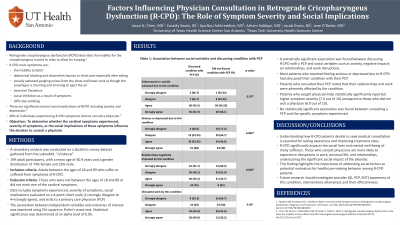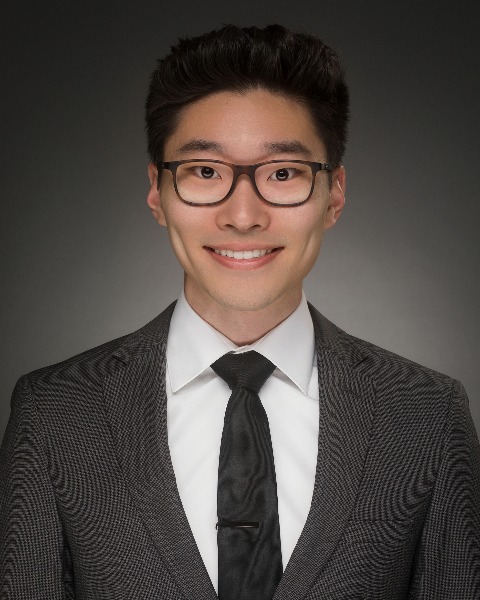Tuesday Poster Session
Category: Esophagus
P3931 - Factors Influencing Physician Consultation in Retrograde Cricopharyngeus Dysfunction (R-CPD): The Role of Symptom Severity and Social Implications
Tuesday, October 29, 2024
10:30 AM - 4:00 PM ET
Location: Exhibit Hall E

Has Audio

Jason N. Chen, MD
University of Texas Health San Antonio
San Antonio, TX
Presenting Author(s)
Jason N.. Chen, MD1, Aya B.. Fakhreddine, MS2, Arham Siddiqui, MD1, Jacob Evans, BS2, Jane O'Rorke, MD1
1University of Texas Health San Antonio, San Antonio, TX; 2Texas Tech University Health Sciences Center School of Medicine, Lubbock, TX
Introduction: Retrograde Cricopharyngeus Dysfunction (R-CPD) is a condition characterized by the inability to burp due to the failure of the cricopharyngeus muscle to relax. Awareness of R-CPD is relatively new and limited. A previous study found that 46% of individuals experiencing R-CPD symptoms did not consult a physician. It is important to investigate the factors influencing whether individuals seek medical advice, as this can enhance treatment rates. This study aims to determine whether the cardinal symptoms experienced, severity of symptoms, or the social implications of these symptoms influence the decision to consult a physician.
Methods: A secondary analysis was conducted on a Qualtrics survey dataset comprising 199 adult participants, with a mean age of 30.9 years and a gender distribution of 74% female and 25% male. Descriptive statistics were used to analyze specific symptoms, symptom severity on a scale of 1 to 10, social life implications on a 4-point Likert scale, and visits to a primary care physician (PCP). The association between independent variables and outcomes of interest was examined using Chi-square or Fisher’s exact test.
Results: A statistically significant association was found between discussing R-CPD with a PCP and social variables such as anxiety, negative impacts on relationships, and work disruptions (Table 1). Most patients who reported feeling anxious or depressed due to R-CPD had discussed their condition with their PCP. Additionally, patients who consulted their PCP noted that their relationships and work were adversely affected by the condition. Patients who sought physician help statistically significantly reported higher symptom severity (7.6 out of 10) compared to those who did not visit a physician (6.9 out of 10). No statistically significant association was found between consulting a PCP and the specific symptoms experienced.
Discussion: Understanding how R-CPD patients decide to seek medical consultation is essential for raising awareness and improving treatment rates. R-CPD significantly impacts the social lives and mental well-being of many sufferers. Those who consult physicians are more likely to experience disruptions in work, personal life, and relationships, underscoring the significant social impact of the disorder. This finding highlights the importance of addressing social factors as potential motivators for healthcare-seeking behavior among R-CPD patients.
Note: The table for this abstract can be viewed in the ePoster Gallery section of the ACG 2024 ePoster Site or in The American Journal of Gastroenterology's abstract supplement issue, both of which will be available starting October 27, 2024.
Disclosures:
Jason N.. Chen, MD1, Aya B.. Fakhreddine, MS2, Arham Siddiqui, MD1, Jacob Evans, BS2, Jane O'Rorke, MD1. P3931 - Factors Influencing Physician Consultation in Retrograde Cricopharyngeus Dysfunction (R-CPD): The Role of Symptom Severity and Social Implications, ACG 2024 Annual Scientific Meeting Abstracts. Philadelphia, PA: American College of Gastroenterology.
1University of Texas Health San Antonio, San Antonio, TX; 2Texas Tech University Health Sciences Center School of Medicine, Lubbock, TX
Introduction: Retrograde Cricopharyngeus Dysfunction (R-CPD) is a condition characterized by the inability to burp due to the failure of the cricopharyngeus muscle to relax. Awareness of R-CPD is relatively new and limited. A previous study found that 46% of individuals experiencing R-CPD symptoms did not consult a physician. It is important to investigate the factors influencing whether individuals seek medical advice, as this can enhance treatment rates. This study aims to determine whether the cardinal symptoms experienced, severity of symptoms, or the social implications of these symptoms influence the decision to consult a physician.
Methods: A secondary analysis was conducted on a Qualtrics survey dataset comprising 199 adult participants, with a mean age of 30.9 years and a gender distribution of 74% female and 25% male. Descriptive statistics were used to analyze specific symptoms, symptom severity on a scale of 1 to 10, social life implications on a 4-point Likert scale, and visits to a primary care physician (PCP). The association between independent variables and outcomes of interest was examined using Chi-square or Fisher’s exact test.
Results: A statistically significant association was found between discussing R-CPD with a PCP and social variables such as anxiety, negative impacts on relationships, and work disruptions (Table 1). Most patients who reported feeling anxious or depressed due to R-CPD had discussed their condition with their PCP. Additionally, patients who consulted their PCP noted that their relationships and work were adversely affected by the condition. Patients who sought physician help statistically significantly reported higher symptom severity (7.6 out of 10) compared to those who did not visit a physician (6.9 out of 10). No statistically significant association was found between consulting a PCP and the specific symptoms experienced.
Discussion: Understanding how R-CPD patients decide to seek medical consultation is essential for raising awareness and improving treatment rates. R-CPD significantly impacts the social lives and mental well-being of many sufferers. Those who consult physicians are more likely to experience disruptions in work, personal life, and relationships, underscoring the significant social impact of the disorder. This finding highlights the importance of addressing social factors as potential motivators for healthcare-seeking behavior among R-CPD patients.
Note: The table for this abstract can be viewed in the ePoster Gallery section of the ACG 2024 ePoster Site or in The American Journal of Gastroenterology's abstract supplement issue, both of which will be available starting October 27, 2024.
Disclosures:
Jason Chen indicated no relevant financial relationships.
Aya Fakhreddine indicated no relevant financial relationships.
Arham Siddiqui indicated no relevant financial relationships.
Jacob Evans indicated no relevant financial relationships.
Jane O'Rorke indicated no relevant financial relationships.
Jason N.. Chen, MD1, Aya B.. Fakhreddine, MS2, Arham Siddiqui, MD1, Jacob Evans, BS2, Jane O'Rorke, MD1. P3931 - Factors Influencing Physician Consultation in Retrograde Cricopharyngeus Dysfunction (R-CPD): The Role of Symptom Severity and Social Implications, ACG 2024 Annual Scientific Meeting Abstracts. Philadelphia, PA: American College of Gastroenterology.
